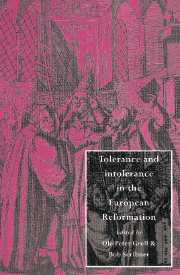Book contents
- Frontmatter
- Contents
- List of contributors
- Preface
- Dedication
- 1 Introduction
- 2 The travail of tolerance: containing chaos in early modern Europe
- 3 Preconditions of tolerance and intolerance in sixteenth-century Germany
- 4 Heresy executions in Reformation Europe, 1520–1565
- 5 Un roi, une loi, deux fois: parameters for the history of Catholic-Reformed co-existence in France, 1555–1685
- 6 Confession, conscience and honour: the limits of magisterial tolerance in sixteenth-century Strassburg
- 7 One Reformation or many? Protestant identities in the later Reformation in Germany
- 8 Toleration in the early Swiss Reformation: the art and politics of Niklaus Manuel of Berne
- 9 Tolerance and intolerance in sixteenth-century Basle
- 10 Exile and tolerance
- 11 The politics of toleration in the Free Netherlands, 1572–1620
- 12 Archbishop Cranmer: concord and tolerance in a changing Church
- 13 Toleration for Catholics in the Puritan revolution
- 14 The question of tolerance in Bohemia and Moravia in the age of the Reformation
- 15 Tolerance and intolerance in sixteenth-century Hungary
- 16 Protestant confessionalisation in the towns of Royal Prussia and the practice of religious toleration in Poland-Lithuania
- Index
5 - Un roi, une loi, deux fois: parameters for the history of Catholic-Reformed co-existence in France, 1555–1685
Published online by Cambridge University Press: 07 December 2009
- Frontmatter
- Contents
- List of contributors
- Preface
- Dedication
- 1 Introduction
- 2 The travail of tolerance: containing chaos in early modern Europe
- 3 Preconditions of tolerance and intolerance in sixteenth-century Germany
- 4 Heresy executions in Reformation Europe, 1520–1565
- 5 Un roi, une loi, deux fois: parameters for the history of Catholic-Reformed co-existence in France, 1555–1685
- 6 Confession, conscience and honour: the limits of magisterial tolerance in sixteenth-century Strassburg
- 7 One Reformation or many? Protestant identities in the later Reformation in Germany
- 8 Toleration in the early Swiss Reformation: the art and politics of Niklaus Manuel of Berne
- 9 Tolerance and intolerance in sixteenth-century Basle
- 10 Exile and tolerance
- 11 The politics of toleration in the Free Netherlands, 1572–1620
- 12 Archbishop Cranmer: concord and tolerance in a changing Church
- 13 Toleration for Catholics in the Puritan revolution
- 14 The question of tolerance in Bohemia and Moravia in the age of the Reformation
- 15 Tolerance and intolerance in sixteenth-century Hungary
- 16 Protestant confessionalisation in the towns of Royal Prussia and the practice of religious toleration in Poland-Lithuania
- Index
Summary
At first glance, France's history in the sixteenth and seventeenth centuries seems to present a series of paradoxes for the historian of tolerance and intolerance. In 1562, the country became one of the first powerful monarchies of the Reformation era to grant freedom of worship to more than one Christian confession, yet over the following decade this pioneer in religious toleration witnessed the era's bloodiest and most horrifying episodes of popular religious intolerance, culminating in the Saint Bartholomew's Massacre. Over the subsequent decades, France moved more successfully toward establishing peaceful co-existence between Catholics and Protestants. Then, despite this success, Louis XIV earned himself an enduring place in the annals of intolerance by revoking the Edict of Nantes. This essay will suggest that the apparent paradoxes of this situation disappear when certain of the potential oversimplifications and pitfalls contained within that somewhat Whiggish construct, the ‘history of toleration’, are recognised, and when the effort is made to write a history of Catholic-Reformed co-existence in France adequate to the complexity of the phenomena. The essay will also try to outline the basic elements of such a history — not always an easy task, since many aspects of the subject remain poorly understood.
The ‘history of toleration’
Toleration is a quality that most members of modern liberal societies prize — until they have to put up with something truly intolerable. Where they might draw the line is infinitely varied. Tolerance is not a polymorphously perverse attribute, capable of extension in any direction, possessed by certain individuals or societies and lacked by others.
- Type
- Chapter
- Information
- Tolerance and Intolerance in the European Reformation , pp. 65 - 93Publisher: Cambridge University PressPrint publication year: 1996
- 7
- Cited by



